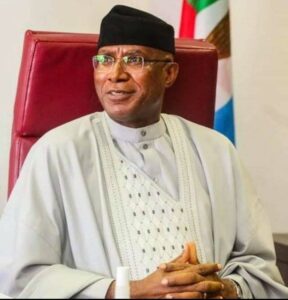Nigerian Firms, Others to Import Coal From South Africa For Power Generation
By Zik Gbemre
We find it disturbing and sad that a country like Nigeria, despite being blessed and endowed with so much mineral resources like natural gas and coal, that holds so much economic potential; is still amongst the poorest countries in the world, to the extent that we have practically become a nation that virtually imports everything to satisfy domestic demands. Apart from the fact that Nigeria has not been able to judiciously utilize its abundant natural gas and coal resources for the benefit of its citizenry and the Nigerian economy, we have become a nation that prefers to import these same natural resources from other countries rather than harness and develop what we abundantly have here.
There are no words to best describe the anomaly when it was recently reported that some industrialists and electricity generating companies have started initiating moves to import coal from South Africa, as a proactive measure against the lingering power supply crisis in the country. According to reports, this is to enable them to switch over to coal-powered turbines for their respective operators. The move was said to have been informed by the frustrations being experienced by the operators in getting gas to fuel their respective power plants. Leading the coal-import initiative from South Africa is Dangote Cement Plc, which has already placed an initial order of 30,000 tonnes of the commodity from the continent’s second largest economy. Already, the company has slated $250 million for power generating conversion , which would involve establishment of three plants at Dangote Cement’s facilities at Obajana in Kogi State; Gboko in Benue State; and Ibeshe in Ogun State. Also, “some Power Generating Companies (GENCOS) have already started considering converting their plants to coal-fired turbines, with unabated crisis in securing gas to power their respective facilities. Mostly affected by the gas paucity crisis are the GENCO that are located inland, which have not got the close proximity advantage to the gas supplying facilities, which are located in the Niger Delta region”, the report noted.
It is also interesting that one of the reports on this issue noted that “Nigeria has been assessed to have about the largest gas reserves in the world, but the parlous supply infrastructure has compromised distribution to various plants requiring the commodity. The nation’s coal reserves remain largely unexploited, even after the Federal Government has sold out the blocs to prospective miners.” We find it appalling that our Nigerian government is quiet and allowing this coal importation moves to run its course. Why should the nation be importing coal from South Africa to power its industries and plants when we have abundant coal deposits waiting to be tapped and utilized? Why should the nation be having power supply issues with its Power Plants when we have enormous gas reserves said to be ranked 7th in the world? Why are we still flaring gas that ought to be utilized to service the nation’s various Power Plants, and by extension address our power supply problems? How come we have become ‘lazy’ as a nation in the development of our mineral resources? Instead, we prefer to import and enrich other nations while the country and its common citizenry suffer lack and want? How long are we going to continue like this as a nation?
Despite the fact that coal exploration in Nigeria started as far back as 1916, it is today a ghost of itself. Available data show that Coal (mainly sub-bituminous steam Coals except for the Lafia-Obi bituminous Coking Coal) occurrences in Nigeria have been indicated in more than 22 Coalfields spread over 13 States of the Federation. The proven Coal reserves so far in Nigeria total about 639 million metric tonnes while the inferred reserves sum up to 2.75 billion metric tonnes. Presently, the Nigeria Coal Industry has 4 existing mines, Okpara and Onyeama Underground Mines in Enugu state, Aba surface mine in Kogi State and Owukpa Underground Mine in Benue State. In addition, there are more than 13 undeveloped Coal fields. The undeveloped Coal fields in Nigeria are of two categories, viz: the Virgin Coal fields where further detailed exploration work and/or access roadways are required and the developing Coalfields where reserves have been proven and Mine access road ways developed. Some of the developing coal fields in Nigeria include: Azagba Lignite field in Delta State; Ogboyoga Coal field in Kogi State; Ezimo Coal field, lnyi Coal field, Amansiodo, and Okpara Mine all in Enugu State; Lafia-Obi Coal field in Nasarawa State; Ute field in Ondo State; Lamla area in Adamawa State; Gindi-Akunti in Plateau State; Afuze in Bauchi State; and Janata-Koji in Kwara State. This is just to give us an idea of the enormous coal fields we have in the country that are just waiting to be developed and utilized.
To enlighten us more, coal has many important uses worldwide. The most significant uses are in electricity generation, steel production, cement manufacturing and as a liquid fuel. Around 6.1 billion tonnes of hard coal were used worldwide in 2010 and 1 billion tonnes of brown coal. Since 2000, global coal consumption has grown faster than any other fuel. Different types of coal have different uses. Steam coal – also known as thermal coal – is mainly used in power generation. Coking coal – also known as metallurgical coal – is mainly used in steel production. The biggest market for coal is Asia, which accounts for over 65% of global coal consumption; although China is responsible for a significant proportion of this.
Other important users of coal include alumina refineries, paper manufacturers, and the chemical and pharmaceutical industries. Several chemical products can be produced from the by-products of coal. Refined coal tar is used in the manufacture of chemicals, such as creosote oil, naphthalene, phenol, and benzene. Ammonia gas recovered from coke ovens is used to manufacture ammonia salts, nitric acid and agricultural fertilizers. Thousands of different products have coal or coal by-products as components: soap, aspirins, solvents, dyes, plastics and fibers, such as rayon and nylon. Coal is also an essential ingredient in the production of specialist products: Activated carbon – used in filters for water and air purification and in kidney dialysis machines; Carbon fiber – an extremely strong but light weight reinforcement material used in construction, mountain bikes and tennis rackets; Silicon metal – used to produce silicones and silanes, which are in turn used to make lubricants, water repellents, resins, cosmetics, hair shampoos and toothpastes. This makes the export of coal a money-making venture that any serious government should strive to actualize. The five largest coal users are China, USA, India, Russia and Japan – and they account for 77% of total global coal use. Japan, Chinese Taipei and Korea, for example, import significant quantities of steam coal for electricity generation and coking coal for steel production.
We decided to paint the above picture to give us a hint of the enormous benefits and revenue we can derive from coal utilization. According to Wikipedia, it was in 1909 that coal was discovered in Enugu, Nigeria. The Ogbete drift mine opened six years later. The Ogbete mine’s operations and others in the country were merged into a new corporation in 1950: The Nigerian Coal Corporation (NCC). The NCC was tasked with exploiting coal resourcesand held a monopoly on coal and coke mining, production, and sales until 1999. However, Nigeria’s coal industry suffered a blow in the 1950s when oil was discovered. Up until this point, the Nigerian Railway Corporation (NRC) was the largest consumer of coal in the country. However, after the discovery of oil, the Railway Corporation began to replace its coal burning trains with diesel-powered engines. An additional negative impact came when the then Electricity Corporation of Nigeria began converting its power generation equipment from coal to diesel and gas as well. The Nigerian Civil War also negatively impacted coal production; many mines were abandoned during the war. Following the war, production never completely recovered and coal production levels were erratic. Attempts at mechanizing production ended badly, as both the implementation and maintenance of imported mining equipment proved troublesome, and hurt production. After the civil war, the Nigerian coal industry has not been able to return to its peak production in the 1950s.
Though, it was in 1999 that the NCC lost its monopoly over the Nigerian coal industry as the Obasanjo government allowed private companies to begin operating coal fields in joint ventures with the NCC, with an eventual goal of completely selling off the NCC’s assets to private investors, however, nothing concrete was achieved at the end of the day. It was only last year that the Federal Government signed a Memorandum of Understanding with HTG/Pacific Energy Company Limited, with substantial technical partnership with Chinese experts, for a $3.7 billion coal-to-power project. So far, the nation is still awaiting the execution of the project, which was scripted to provide an initial 1,200 mega watts power plant to be built at Enugu, using coal from the Ezima mine.
Looking at the history of our energy sector, it is funny how our political leaders have used their inept leadership-pioneering to bring us where we are today. First, the discovery of coal gave birth to exploration of coal as our major source of energy supply. But the discovery of crude oil and later natural gas has made our political leaders to practically abandon coal and its development. Now that it seems like access to gas supply is readily not enough to satisfy domestic demands and export, our industrialists and those in the power sector are trying to resort back to coal, but they are doing so by looking outside the country and not within. And like the Group Managing Director of Dangote Cement, Devakupar Edwin had noted in the above report, ‘‘no business can survive in an atmosphere of energy crisis. If we don’t have power and fuel, our operations would become endangered.” Thought, Edwin explained that the coal importation agenda was only scripted as a temporary measure, to forestall system collapse in their operations; we are however not in support of the idea of the country importing what it has in abundance at home. At the same time, we however understand the predicament being faced by industrialists at the moment in sustaining production in the face of energy scarcity. But who is to blame?
As noted by Edwin, ‘‘We are aware of large coal deposits in Nigeria and the allocation of blocs to prospective miners. But we have to take urgent steps to safeguard our investments in the country, more so as exploitation of the commodity has not commenced on a scale that can sustain our operations. Currently, we don’t have either gas or black oil (low pour fuel oil) to run our machines fully. We even had to resort to importation of black oil to do our business. We, however, have a plan to look inwards in respect of coal sourcing, as we expect the companies that have secured coal blocs to commence their respective mining operations in the country. We had hoped that the gas infrastructure challenges would be resolved, so that normal supplies can be resumed. But the reality on the ground now is that the crisis has persisted.
The crux of the matter is that we have no excuse as a nation to be importing coal or whatever source of energy supply from other African or Western countries when the nation is blessed beyond measure in different energy-source minerals. What is exactly happening in Nigeria’s energy development and production sector in the over five decades the sector has gone commercial? For Nigeria’s industrialists and power sector operators to now consider the importation of coal from South Africa to sustain their business, clearly shows that something is intricately wrong somewhere. In fact, it is a shame on the current administration and its designated Parastatals and Ministries in the energy sector that this is happening.
The idea of importing coal or any other source of energy supply from other countries should not, and never be encouraged by this administration no matter who or what is involved. As a nation, we should not always follow the ‘easy way out’ in addressing our challenges, but we should always learn to squally focus inwardly and address our problems. Even if it is said to be temporary, the truth is that if we start encouraging this trend of seeking energy source from other countries, the country is not only postponing ‘doomsday’, we are equally further neglecting the development of our abundant energy-source minerals. We have these mineral resources in abundant here, let the Nigerian Government and its parastatals, both at the State and Federal Government levels, do whatever that needs to be done to ensure that industrialists and other businesses, including the power sector operators, do not go elsewhere outside Nigeria to seek for energy source. Let the government start giving coal development and production in the country, the attention it seriously needs. By so doing, the nation’s power problems will equally be addressed. Let the right thing be done, this we urge.
Zik Gbemre, JP
National Coordinator
Niger Delta Peace Coalition



